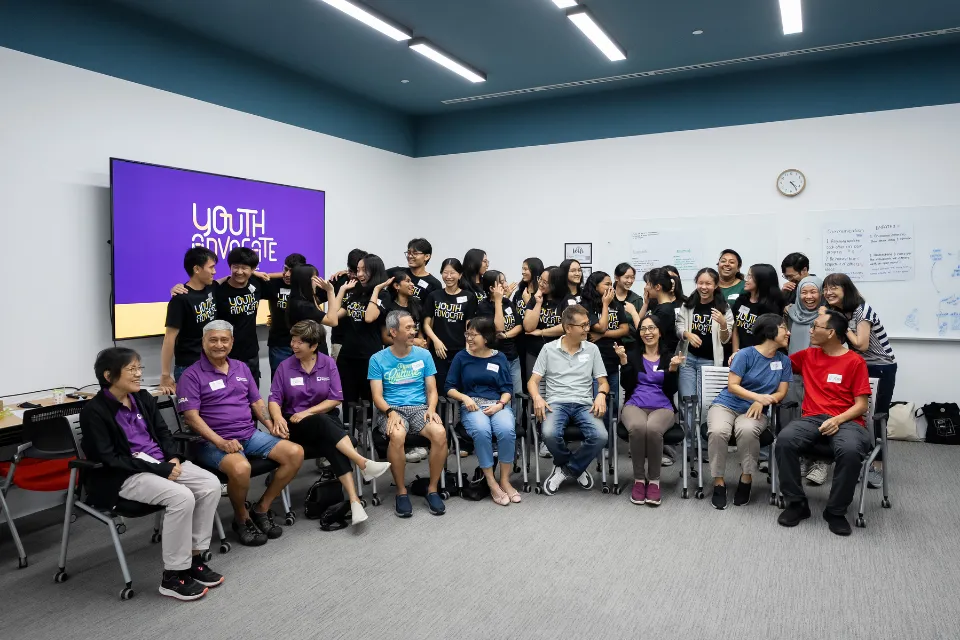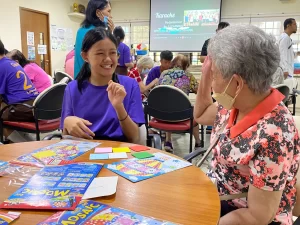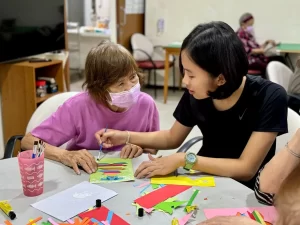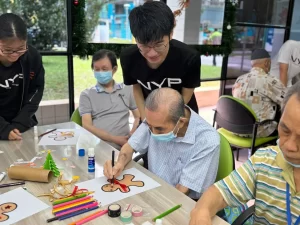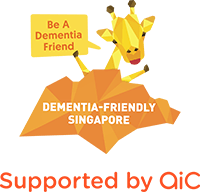Explore the power of intergenerational engagement in connecting youths and persons living with dementia. These interactions foster valuable life skills like communication and empathy while creating meaningful cross-generational relationships.
A New Way to Make a Difference
Imagine stepping into a volunteer session, uncertain of what to expect, then a person living with dementia begins sharing their life story. That is exactly what happened to Terrence Ding, a Youth Community Leader and volunteer at Dementia Singapore (DSG).
Initially, he was simply trying to earn hours for a youth achievement award, but when a woman with dementia shared her life story, it changed everything. “Even if they forget, everyone has a story to tell,” he reflects. This is the essence of intergenerational engagement. It is about fostering connections between the younger and older generations, especially those living with dementia. It is more than volunteering; it challenges assumptions and forges relationships beyond age.
Why Intergenerational Engagement Matters
Engaging with older generations is more than filling out volunteer hours, it is about creating lasting connections. In Singapore, many existing intergenerational programmes focus on pairing pre-school children and persons living with dementia. A welcome change seen in recent years is youths aged 15-24 stepping up, bringing fresh energy to these programmes. When youths volunteer in intergenerational programmes, it is much more than giving up time; it is about creating change in the life of both seniors and youths.
Why Youths Should Interact with Persons Living with Dementia: Not Just About Providing Help
If you are a youth, consider getting involved engaging persons living with dementia as it is more than just offering companionship, it also:
- Develops important life skills: These interactions are a great way to develop communication skills, empathy, patience, and leadership skills1. Learning how to communicate with empathy with persons living with dementia can be a valuable experience.
- Create meaningful connections: Intergenerational engagement fosters cross-generational bonds and helps reduce social isolation among persons living with dementia.2 In sharing stories and perspectives, youths develop a deeper understanding of others, expanding their worldview.
- Make an Impact: Youth participation in intergenerational programmes, raises awareness on dementia among peers, ensuring that future generations can be more informed and empathetic toward them.
Navigating Intergenerational Interactions
Like any new experience, engaging with persons living with dementia may come with unfamiliar moments. But the good news is, these moments can be opportunities to learn and grow.
Here are some ways youths can turn these challenges into opportunities:
- Barrier 1: Time Constraints
As a youth, juggling school, social life, and extracurricular activities can make it difficult to find the time to volunteer.
Solution: Flexibility is key. Programmes at DSG and other senior activity centers (SACs) offer flexible schedules, allowing you to start small with just one or two hours a week and slowly increase your involvement.
- Barrier 2: Unfamiliar in communicating with persons living with dementia.
If you have not spent much time with persons living with dementia, you may be unsure how to interact with them.
Solution: Support and training. Volunteer programmes and student-led initiatives like ProjectEDEN often provide briefings that teach you how to communicate and connect with persons living with dementia. These equip you with the skillset and confidence needed for meaningful interactions.
By stepping into this space, youths will grow as individuals and be a bridge between generations.
How to Get Involved
Are you ready to make your mark? Your involvement helps create a lasting change. Here are some ways to help you get started:
- Activity Facilitation: Lead and organise fun activities like reminiscence sessions or arts and crafts like those available at Sengkang Community Hospital, fostering meaningful connections with persons living with dementia.
- Befriender to Persons living with Dementia: Spend time with persons with dementia, offering companionship in care centers or through home visits. These simple interactions can significantly improve their quality of life.
- Outreach and Awareness: Raise awareness about dementia, like your peers who led projects such as Eunoia Junior College’s Project Dandelion, sparking important conversations among students. Help organise events, share information, and build a more dementia-friendly community in your school or neighbourhood.
Additionally, if you are a youth and ready to take your involvement to the next level, consider joining the Youth Advocate Programme. This initiative will train you in dementia communication, offer valuable insights into dementia care, and give you the opportunity to create your own dementia advocacy project!
''Volunteering at the centres has given me first-hand experience of interacting with persons living with dementia, which is a very good skill to have!"
Terrence Ding
Whether it is volunteering, becoming a befriender, or raising awareness, every action counts.
Use this link or these hashtags #YouthsForDementiaSingapore and #DSGYouthAdvocates on Instagram to find out more and connect with other volunteers. Download our starter kits from the resource tab like the Youth Hope Intergenerational Toolkit which comes with resources, templates, and activity ideas to help guide you along the way.
Together, we can create a dementia-friendly future!
- Canning, S. E., Gaetz, M., & Blakeborough, D. (2018). It takes time: Building relationships and understanding through an intergenerational ballet programme. Dementia, 19(2), 270–284. https://doi.org/10.1177/1471301218772895
- Houghton, C., Hennessy, M., Smyth, S., et al. (2022). The experiences and perceptions of young people and older people living with dementia of participating in intergenerational programmes: A qualitative evidence synthesis. Dementia, 21(7), 2144–2171. https://doi.org/10.1177/14713012221112385
- Nanda, A. (2024). Beneficial bonding: When people with dementia interact with kids and youth. The Straits Times. https://www.straitstimes.com/life/beneficial-bonding-when-people-with-dementia-interact-with-kids-and-youth

